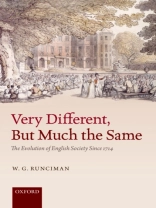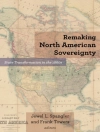Very Different, but Much the Same takes as its starting point the distribution of political, ideological, and economic power between English society’s constituent roles from the time when Daniel Defoe was writing Robinson Crusoe, and argues that Defoe would find it remarkably similar three centuries later despite all the changes in technology, lifestyles, amenities, beliefs, attitudes, norms, and values by which he would no doubt be astonished. The disjunction between the two is explained by bringing to bear the approach of current evolutionary sociological theory in which the reproduction or extinction of a society’s institutional practices is traced to selective environmental pressures which are independent of the personal motives and subjective experiences of the individuals whose practices they are. It is further argued that the rates of high absolute and low relative social mobility that sociologists have documented in detail forthe twentieth century are likely to have been much the same during the eighteenth and nineteenth centuries. The conclusion drawn is that for as long as the country was not defeated in a European war, the probability of a radical change in institutional distribution of power was extremely lowthroughout, however much contemporary observers or later historians would have either welcomed or deplored it.
W. G. Runciman
Very Different, But Much the Same [PDF ebook]
The Evolution of English Society Since 1714
Very Different, But Much the Same [PDF ebook]
The Evolution of English Society Since 1714
Acquista questo ebook e ricevine 1 in più GRATIS!
Lingua Inglese ● Formato PDF ● Pagine 256 ● ISBN 9780191020896 ● Casa editrice OUP Oxford ● Pubblicato 2014 ● Scaricabile 3 volte ● Moneta EUR ● ID 3434466 ● Protezione dalla copia Adobe DRM
Richiede un lettore di ebook compatibile con DRM












